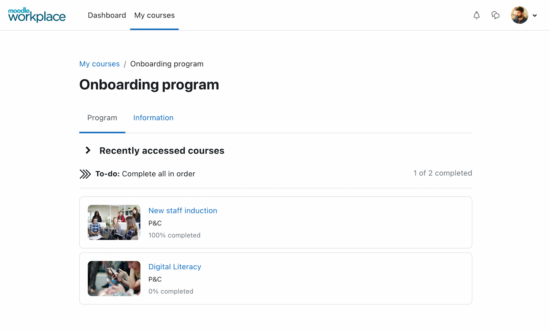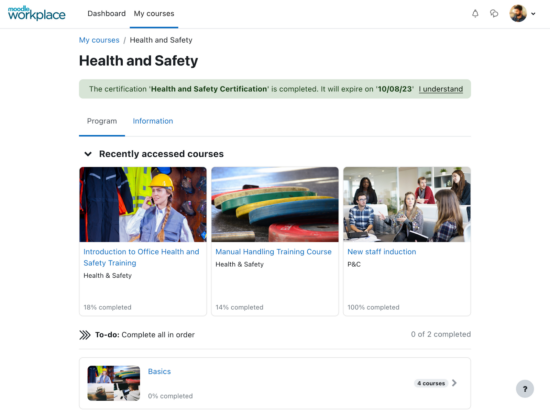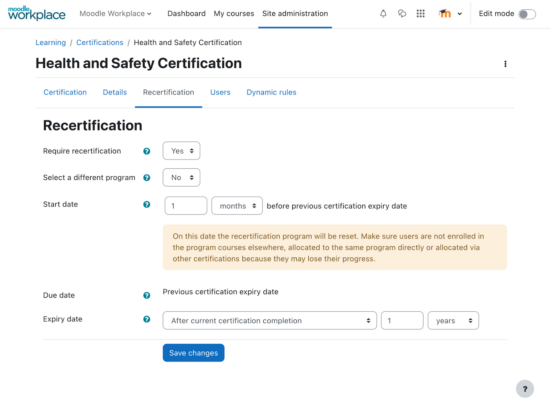Mandatory employee training is often an essential component of maintaining a safe and productive workplace. Regardless of the industry your organisation belongs to, you likely have specific training requirements to uphold in order to meet policy or regulatory standards, whether these pertain to human resources, health and safety, or competency assessments.
A learning management platform can make mandatory training a seamless and stress-free process. Moodle Workplace is an enterprise learning management platform that makes it easy and efficient to train and engage employees. You can assign and schedule courses and programs, track learner progress on courses and certifications, and create learning journeys for staff while rewarding progress and achievements with certificates or badges.
But before setting up any type of course or training program, it’s important to consider your goals. Does your staff need to learn a new skill, or is your training strictly compliance-focused? Will you need to allow for annual recertification?
If your goal is strictly compliance, then your course might be as simple as some content and a quiz or assessment that you administer every year. If instead you’re focused on building knowledge or skills, setting up different programs over time is more effective. Outline what you need your employees to learn or understand, as well as the outcome you require as a manager.
Now that you’ve considered your bigger picture goals, let’s review a few different use cases and how you can leverage Moodle Workplace for each.
Scenario 1: Single instance training for a specific topic
Sometimes your staff only needs to complete a training once. For example, you might have training for new hires, or training around a new software system, technology, policy, or procedure. In these cases, the best option is to build it into a single course.
After your course content and learning activities are set up, you can leverage dynamic rules to automate certain actions and the report builder to track completion. Dynamic rules allow you to define and execute centralised and automated rules using an “if this then that” conditional approach to trigger actions when certain conditions are met.
For instance, dynamic rules can be used to enrol learners in courses based on a profile field, job title, or department, or even the completion of other training as a sort of prerequisite. Once enrolled, dynamic rules can again be used to remind users to complete the training. And when completed, a personalised certificate can be delivered to the learner and their supervisor to recognise their achievement, as outlined in your organisation structure. In addition to notifications, learners can track their progress and expiration, recertification, or due dates, all from the Workplace dashboard.
Workplace also allows you to set up automated reports to list those who haven’t yet completed the course, or a detailed percentage of completion, last access, completion date, plus custom profile fields with employee data (e.g., department, location, etc.). Supervisors or HR can receive reports for all or specific employees without even needing to log into Moodle.
Scenario 2: Annual compliance training
Your organisation may have compliance training that employees need to complete on an annual basis. This could be a set of courses every year that are focused on knowledge and capabilities. A few examples of this would be training on bloodborne pathogens, the Family Educational Rights and Privacy Act (FERPA), the Health Insurance Portability and Accountability Act (HIPAA), human resources topics like sexual harassment, or cyber security. You may also have role-specific training that only certain employees need to complete.
Moodle Workplace programs allow you to create learning pathways for employees by adding a combination of courses or a hierarchical sequence of courses. Programs can be specific to an audience, and the order of courses can be flexible or mandatory. You can also set your program to require a minimum number of courses out of a set as opposed to requiring they all be completed.
You can then layer on certifications to track and confirm annual compliance for every employee. Each certification can be set up with an expiration date with a designated recertification period; when it’s time for employees to recertify, the courses within the program automatically reset and employees will be prompted to complete it again. Expiration can be set on a variety of schedules, typically on a rolling basis dependent on the certification start date or date of last certification. You also have the ability to set how much lead time should be given before the expiration date; for example, a course could automatically reset 30 days before the expiration date.
As in our first use case, dynamic rules can be used to set up welcome and reminder emails. They can also be used to issue a certificate or badge for completing the entire program, rather than one for each individual course.
In addition to reports that show who has and has not completed their training, there are also reports that show historical data like previous year completion dates. This is useful in case you need to review an employee’s training history. Certification completion data can also be passed to another system, such as an HR system, via an API or integration. For assistance with integrations like these, get in touch with our services and support team.
Scenario 3: Annual certification with refresher training in subsequent years
Let’s say you want employees to go through a full program for their initial compliance training, but want to enable shorter, refresher courses for their annual recertification. This scenario functions much like scenario two above, but you can assign a new set of courses for the program for year two and beyond of certification renewal. This is a great way to introduce new and updated information without requiring employees to do the full training again.
Easily track compliance and training with Moodle Workplace
Each of these use cases is common across a wide range of industries, and it’s likely your organisation will want to implement a variety of features. Moodle Workplace makes it simple and intuitive to administer and track training and compliance so that you can spend less time on administrative tasks and more time on high value work.






